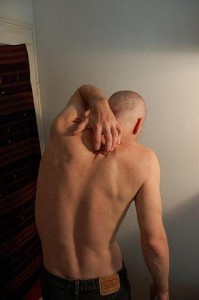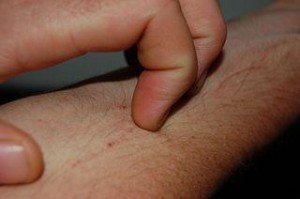Nighttime Itching Reasons, Causes, Remedies, Treatment
Although itching can occur at any time in the day or night, it has been found that itching tends to exacerbate around nightfall in certain skin and systemic conditions. It may persist throughout the night and affect normal sleep patterns. The exact reason why itching worsens at night is unclear but there are some theories to explain this phenomenon.
Understanding these possible mechanisms can be helpful in finding measures to counteract nighttime itching. However, it is important to note that symptom is more likely to occur in people with underlying diseases and treatment should therefore be targeted at the root cause.
Why itching worsens at night?
Many people with skin conditions like atopic dermatitis and psoriasis report that itching worsens at night (nocturnal pruritus). It may also be seen in systemic conditions like chronic renal (kidney) failure where itchy skin is present. Although this nighttime exacerbation of the itching does not occur in every person, it is significant time-related symptom that may warrant specific treatment beyond the other measures that are being used to treat the existing disease. Similarly, there may be simple home remedies that can help in terms of lifestyle changes in particular.

Circadian Rhythm
It is believed that itching may worsen at night due to the various changes in the circadian rhythm. The circadian rhythm is the body’s ‘internal clock’ of sorts where different biological processes seem to correlate with a 24 hour period on a daily basis. For example, certain hormone levels increase at specific times in a day and this change may be independent of the acts of eating or sleeping.
In terms of the circadian rhythm, it appears that several of these processes may collectively or individually contribute to nighttime itching.
- Raised skin temperature tends to occur at night. This rise in skin temperature may worsen itching by increasing the levels of itch mediators in the skin.
- Water loss through the skin known as trans-epidermal water loss (TEWL) increases at night. Apart from dryness, it may also make the skin more prone to environmental irritants.
- Natural pain-relieving agents may increase at night instead of the morning in a distorted circadian rhythm. A reduction in pain is associated with an increased perception of itching.
- Corticosteroid levels in the body decrease at night which means its anti-inflammatory effect subsides temporarily. It therefore leads to an increase in itching in inflammatory skin conditions.
- Parasympathetic activity increases at night while sympathetic activity increases in the morning. These changes in the autonomic nervous system may be responsible for itching.
- Cytokine and prostglandin changes may be altered in a disturbed circadian rhythm and substances such as interleukin (IL-2, IL-8 and IL-31) have been shown to induce itching.
However, it is important to note that the exact mechanism by which itching worsens at night in relation to the circadian rhythm has not been conclusively identified. The itching may be localized, where the itch only occurs in certain isolated parts of the body. With generalized pruritus, there is itching throughout the body.
Sleep and Stimuli
The reduction in stimuli at night and especially when sleeping may make a person more aware of the itching. In this instance the itching may not have significantly increased at night but rather the heightened perception of it gives the impression of nighttime itching.
In fact itching has been shown to disturb the sleep patterns of people suffering with inflammatory skin diseases. Studies have shown that people with severe nocturnal pruritus spend less time in non-REM sleep. This in turn can lead to irritability and other mood changes which may have a psychogenic effect on itch perception.
Bed, Linen and Clothing
Certain skin conditions may be linked to the bed, bed linen and nighttime clothing. These textiles may irritate the skin as is seen in irritant contact dermatitis. Usually non-irritant material are used for manufacturing these items but can be ‘itchy’ when new. Some people may be allergic to certain textiles as may occur in allergic contact dermatitis. Wool blankets often irritate the skin and some people may also be allergic to certain types of wool.
Bed Insects
In conditions like scabies and body lice infestation the insects tend to hide on the bed, in the linen and even the clothing. Some insects are night feeders and are therefore more likely to cause symptoms at night. People with a house dust mite allergy may also find an aggravation at night as these organisms often infest the mattress and surrounding items. Read more on itch caused by dust and mites.

Cause of Nocturnal Pruritus
Nocturnal pruritus may occur in any itchy skin condition. Another type of sensation that may be similar is formication where it feels like insects are crawling on the skin. People with the following inflammatory skin conditions often report an exacerbation in nighttime itching:
- Atopic dermatitis
- Psoriasis
- Urticaria (hives)
- Lichen simplex chronicus
It may also be a feature in people with chronic renal (kidney) failure, liver diseases and certain blood disorders where itching is a symptom. Sometimes the cause is as simple as excessively dry skin (xeroderma) without any skin disease. Furthermore psychogenic itching may be more noticeable at night for reasons discussed above. People with a history of insomnia may also complain of itching at night although it is difficult to isolate it to an underlying physiological mechanism.
Video
This video on causes of nighttime itching was produced by the Health Hype team.
Remedies for Nighttime Itching
The article on how to relive nighttime itching provides conservative measures that may help. This includes:
- Avoiding the use of antibacterial and scented soaps or lotions at night.
- Using a thicker moisturizer especially for dry skin and skin diseases.
- Bathing shortly before bedtime to remove any irritants on the skin, including sweat.
- Cooling down the room or providing for better ventilation.
- Regularly changing the bed linen, even daily if necessary.
- Taking care of the mattress by changing it at regular intervals, turning it around or using a mattress protector.
- Wearing light cotton sleep clothing rather than thick wool pajamas.
- Eradicating any pests that may have infested the mattress or bedroom.
Treatment for Nocturnal Itching
Sometimes the conservative measures discussed above are insufficient to reduce or prevent nighttime itching. In these instances medication may be necessary, especially if the nighttime itching is due to underlying skin diseases. It is important to first consult with a doctor for the appropriate medication.
- Antihistamines reduce the level of histamine which may induce itching.
- Corticosteroids work by reducing inflammation in inflammatory skin conditions.
- Calcineurin inhibitors work in a similar way as corticosteroids by suppressing immune activity.
- Antidepressants may sometimes be helpful in reducing itching, particularly in psychogenic cases.
References
- Nocturnal pruritus. NIH.gov
- Treatment of itchy skin. Mayo Clinic





